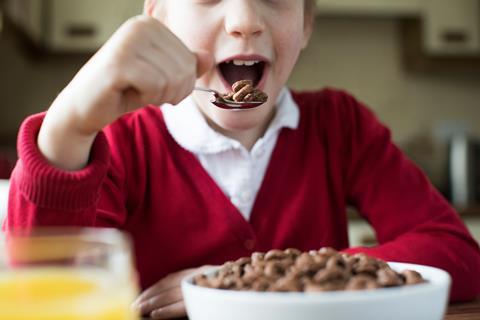
Volume sales of branded cereals are looking soggy. They’re down 8%, meaning their 2.9% rise in value was entirely price driven.
Of the top 20 brands, 16 have shifted fewer kilos than last year. Take market leader Weetabix, which has lost 11.3% of volumes. Head of category & in-store excellence Chris Dubois attributes this to shoppers migrating to the discounters, trading down to own label, and simply buying less food.
To avoid further declines, Weetabix has focused on “driving added value for shoppers”. That included an on-pack promotion over summer to give away official FA merch to coincide with the FIFA Women’s World Cup.
HFSS hits cereal volume sales in 2023
The brand also unveiled new-look packaging in October, championing its use of home-grown wheat, and launched a traceability website. It allows shoppers to find out more about the farms within the Weetabix Growers Group.
Cereal Partners has similarly played up the role of farmers since launching its Nestlé Wheat Plan in June 2022. It’s an initiative designed to boost regenerative farming practices for Shredded Wheat, with information about the scheme rolling out across the brand’s packs, but it couldn’t prevent Shredded Wheat volume losses from accelerating to 9.7%, from 3.2% last year.
Elsewhere, volume declines were the result of the HFSS rules that stopped indulgent lines being merchandised in key areas in supermarkets. Crunchy Nut, for instance, is down 12%. It’s also lost £3.2m. Still, it could be worse, suggests Kellogg’s revenue & channel director Andy Williams. The supplier has been able to “minimise volume declines” by absorbing cost pressures “where possible”, he says. Indeed, Crunchy Nut has seen average price per kilo rise 10.2%, while cereal brands overall are 11.8% pricier.
Fuel10K value and volume sales on the rise
For Kellogg’s stablemate Wheats, price increases have been kept to a minimum of 1.4% – helping it grow volumes faster than any other top 20 brand. It’s up 28.6%. Williams says this is thanks in part to “key innovation over the last two years” – such as non-HFSS variants Apricot, Blueberry and Plain added in October 2021.
Similarly, healthy player Fuel10K has also seen volume and value sales rocket. They’re up 27.4% on a £6.6m (or 46.7%) gain to £20.8m. Performance was driven largely by distribution gains across the multiples as well as the launch of its porridge sachets in September 2022, says MD Scott Chassels – at a time when leading porridge brand Quaker lost volume sales off the back of double-digit price increases.
So it was little surprise the fast-growing Fuel10K was snapped up for £34m in October by Premier Foods – with ambitions to make it a “major entry” in the breakfast market.
Top Launch 2023
Kit Kat Cereal | Cereal Partners
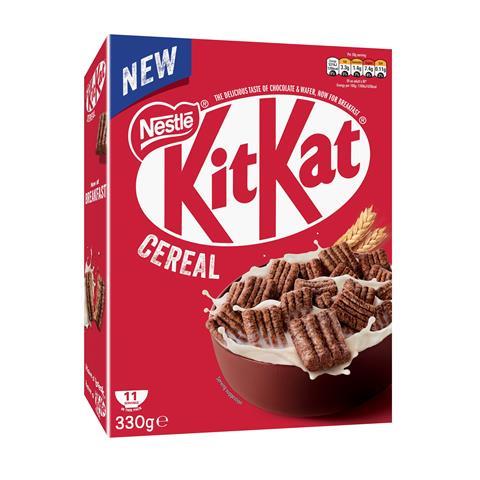
Kit Kat Cereal hit supermarket shelves in April to much fanfare. And plenty of criticism. The crispy wheat squares with a milk chocolate-flavoured coating (rsp: £3.50/330g) were bashed by health campaigners, who said the product flew in the face of HFSS legislation. On social media, former health tsar Henry Dimbleby claimed marketing of the cereal – as “tasty and nutritious” – was misleading. Owner Nestlé waved him away, adding Kit Kat Cereal was “an occasional, indulgent breakfast option”.
Face off: Top Products Survey 2023 pits brands vs own-label
![Beans Face Off_RGB[18]](https://dmrqkbkq8el9i.cloudfront.net/Pictures/261x166/9/5/1/311951_beansfaceoff_rgb18_56926_crop.jpg)
It’s no longer a battle of the brands. The bigger battle, after two years of inflation, is between brands and own label. Who’s winning?
- 1
- 2
- 3
- 4
- 5
- 6
- 7
- 8
- 9
- 10
 Currently
reading
Currently
reading
Cereal 2023: Cost of living and HFSS hit cereal brands
- 12
- 13
- 14
- 15
- 16
- 17
- 18
- 19
- 20
- 21
- 22
- 23
- 24
- 25
- 26
- 27
- 28
- 29
- 30
- 31
- 32
- 33
- 34
- 35
- 36
- 37
- 38
- 39
- 40
- 41
- 42
- 43
- 44
- 45
- 46




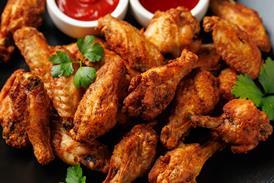


![Beans Face Off_RGB[18]](https://www.thegrocer.co.uk/Pictures/80x50/9/5/1/311951_beansfaceoff_rgb18_56926_crop.jpg)













































![Beans Face Off_RGB[18]](https://dmrqkbkq8el9i.cloudfront.net/Pictures/80x50/9/5/1/311951_beansfaceoff_rgb18_56926_crop.jpg)












































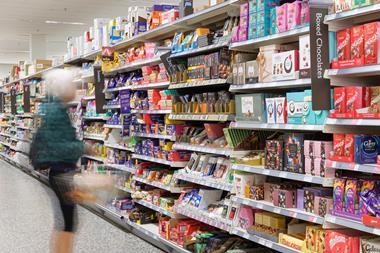


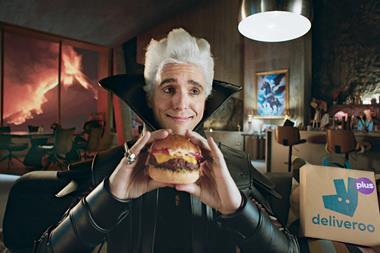
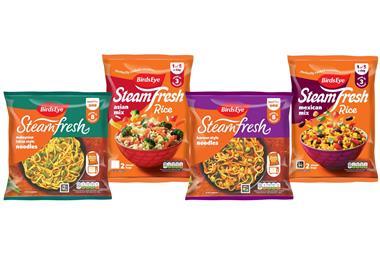
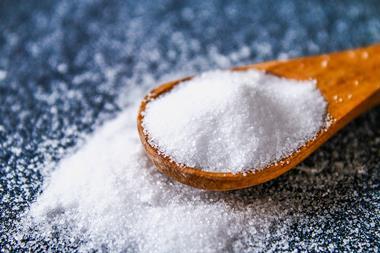






No comments yet